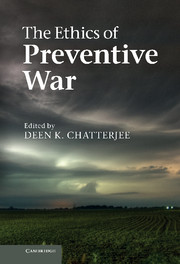Book contents
- Frontmatter
- Contents
- Contributors
- 1 Introduction
- PART I CONCEPTUAL, NORMATIVE, AND METHODOLOGICAL TERRAINS
- PART II INTERNATIONAL LAW
- PART III CRITIQUES OF PREVENTIVE WAR
- 8 The conditions of liability to preventive attack
- 9 Are preventive wars always wrong?
- 10 Ethics and legality: US prevention in Iran
- PART IV BEYOND PREVENTIVE WAR: EXPLORING OTHER OPTIONS
- Bibliography
- Index
- References
10 - Ethics and legality: US prevention in Iran
Published online by Cambridge University Press: 05 April 2013
- Frontmatter
- Contents
- Contributors
- 1 Introduction
- PART I CONCEPTUAL, NORMATIVE, AND METHODOLOGICAL TERRAINS
- PART II INTERNATIONAL LAW
- PART III CRITIQUES OF PREVENTIVE WAR
- 8 The conditions of liability to preventive attack
- 9 Are preventive wars always wrong?
- 10 Ethics and legality: US prevention in Iran
- PART IV BEYOND PREVENTIVE WAR: EXPLORING OTHER OPTIONS
- Bibliography
- Index
- References
Summary
INTRODUCTION
The US response to the nuclear threat posed by Iran inhabits territory perennially mired with ethical, legal, and moral quandaries. The public release of the National Intelligence Estimate on Iran’s nuclear program in December 2007 (2007 NIE) created somewhat of a watershed for the then Bush administration’s counter-proliferation policy on Iran, reinvigorating debates surrounding the justifications for the US policy of preventive force to respond to states posing a nuclear threat. The 2007 NIE concluded that Iran halted its nuclear weapons program in 2003 and that, as of late 2007, the program remained suspended.
However, reading the 2007 NIE in conjunction with contemporaneous (and subsequent) findings of the United Nations’ International Atomic Energy Agency (IAEA) has created more concerns and confusion than it has allayed. While IAEA reports have vindicated the 2007 NIE in certain respects, they have also stated that, since early 2006, “the Agency’s knowledge about Iran’s current nuclear programme is diminishing.” More recently, a new National Intelligence Estimate circulated among the US intelligence community in February 2011 (2011 NIE) – although not available in declassified form – concluded that it is likely that Tehran has resumed work on nuclear weapons research in addition to expanding its program to enrich uranium. This has been substantiated by the IAEA’s May 2012 report, which stated that IAEA inspectors had found traces of uranium being enriched at 27 percent at Iran’s Fordow site – a higher level of enrichment than previously found. While US officials report that at least some of the 2007 assertions have been revised in the new NIE, the new assessment stops short of rejecting the earlier findings.
- Type
- Chapter
- Information
- The Ethics of Preventive War , pp. 166 - 186Publisher: Cambridge University PressPrint publication year: 2013



